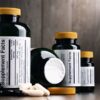Imagine if a prescription medication you were taking was found to contain another drug or ingredient that wasn’t supposed to be there. You would expect it to be recalled from the market immediately, right? Yet when it comes to supplements, the FDA appears to be turning a blind eye far too often when this is the case, and it is putting the public’s health at serious risk.
Yesterday, we reported on a new study finding that many supplements billed as treatments for sexual dysfunction and weight loss contain prescription medications, experimental drugs, or even medications that have been pulled from the market. You’ve likely seen these products in small packets at your local convenience store or gas station.
While it’s alarming that Viagra (sildenafil) was found in many erectile dysfunction supplements – even though labeling on many such products claim they are “all natural,” and supplements aren’t supposed to contain prescription drugs – it’s even more disturbing what the FDA has done (or rather, hasn’t) in response. Of the 776 products containing drugs, only 46% were voluntarily recalled from the market. That leaves the majority of these adulterated products on the market.
‘Dereliction of Duty’
It’s no wonder that the title of an editorial accompanying the study said the FDA is committing a “dereliction of duty.” What little action the FDA has taken is akin to a slap on the wrist.
Part of the problem is that the FDA is not as aggressive as it could be in going after unscrupulous supplement manufacturers. If a firm doesn’t respond to a voluntary recall, the FDA could follow up with a more serious warning letter, factory inspection or even mandatory recall. However, only 7 warning letters were issued over the course of the study (2007-2016), and there were no mandatory recalls.
If you are perplexed that the FDA knows these products have prescription or other drugs in them – which could lead to adverse events because of other medications a person may be taking or because the drug itself is unsafe – and then doesn’t pull them from the market, so am I. But I think I have an idea why.
Supplements aren’t treated the same way that prescription drugs are. The FDA is fairly hands-off on regulating supplements. In fact, it rarely investigates supplements unless reports of a potential problem with one are made. Unlike prescription drugs, supplements don’t have to demonstrate to the agency through clinical trials that they are safe and effective. According to the FDA, supplement “firms are responsible for evaluating the safety and labeling of their products.” This could be why the FDA doesn’t take issues with supplements as seriously as those that crop up with prescription drugs.
So what can be done? Tighter regulation of supplements is a must. Congress could change regulations so that supplement manufacturers must register their products before they hit the market. But why not make supplements go through a rigorous approval process just like drugs do? After all, supplements are a $35 billion-a-year industry.
In the meantime, be cautious when taking supplements that are a combination of ingredients, and stick to those that contain just one. And those claims on the label? Just remember they aren’t necessarily backed up by any evidence.






